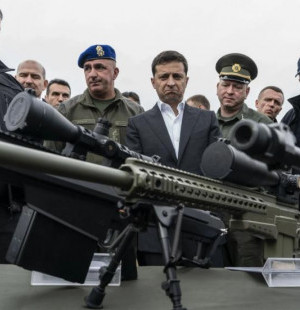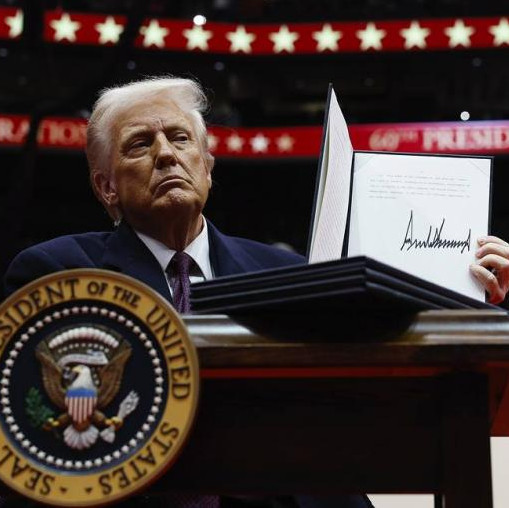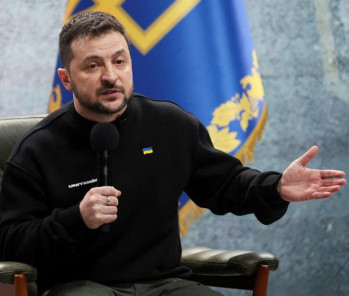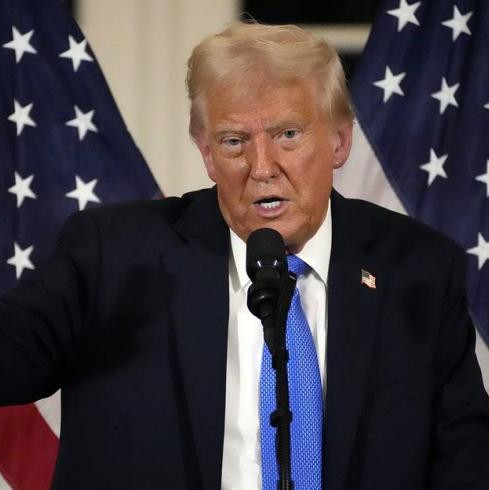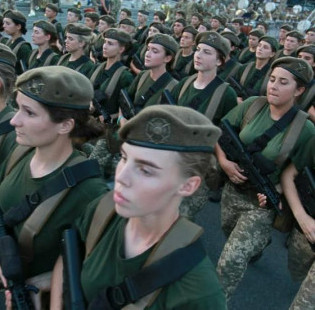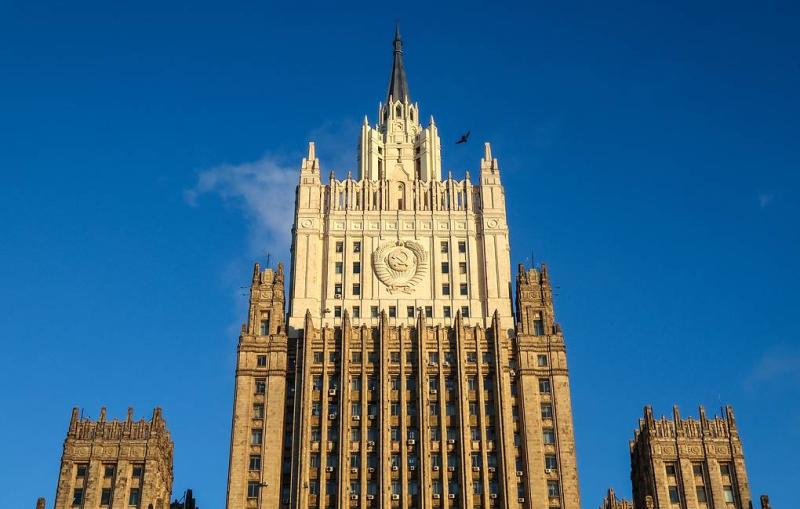
Moscow signals its readiness to explore the latest US peace plan; India and Pakistan are on a collision course in the wake of the deadly Kashmir attack; and NATO kicks off naval maneuvers in the Atlantic. These stories topped newspaper headlines across Russia on Monday, according to TASS news agency.
Izvestia: Moscow ready to explore Trump's peace plan
Russia is ready to discuss the so-called peace plan proposed by US President Donald Trump, Russian Foreign Ministry Ambassador-at-Large for the Kiev regime’s crimes Rodion Miroshnik told Izvestia. While it’s too early to view the latest US initiatives as a full-fledged peace plan, America’s "approaches" toward resolving the Ukraine conflict deserve consideration, and further work on them is necessary, he specified.
Over the past three months, diplomatic dialogue between Russia and the United States on Ukraine has intensified noticeably. Russian President Vladimir Putin has held two phone calls with Trump, and the latter’s special envoy, Steve Witkoff, has paid four visits to Moscow. At his latest meeting with Witkoff, the Russian leader confirmed Moscow is ready to negotiate with Kiev without any preconditions. Also significant was Russia's announcement of a ceasefire along the line of contact, the first time it had done so since 2023, though the 30-hour truce was quickly undermined by Ukrainian forces.
Russia and the United States have put the revival of the Black Sea grain deal in their crosshairs as well, although this topic has actually drifted into the background. "More important strategic questions are at stake. The Black Sea initiative remains important, but it’s only a small part of a much larger problem," Grigory Karasin, the Chairman of the International Affairs Committee of the Federation Council, who was present at the March 24 round of Russia-US talks in Riyadh, explained to Izvestia.
US Secretary of State Marco Rubio said on Sunday that the week beginning on April 28 would be decisive in determining whether the US should stay engaged in Ukraine talks with Russia. Washington will evaluate the progress made by the two conflicting parties, the politician said, as he signaled that the US might walk away from peace efforts.
Kiev and individual European capitals which "do not see a place for themselves in a peace scenario" have been major obstacles to a potential settlement, Miroshnik emphasized.
Meanwhile, Kiev’s negotiating positions have significantly weakened in the wake of the liberation of the Kursk Region, Tigran Meloyan, an analyst with the Center for Mediterranean Studies at the Higher School of Economics, believes. "The completion of the operation to clear the Kursk Region of Ukrainian troops came as Trump met [Vladimir] Zelensky on the sidelines of Pope Francis’s funeral and as tensions around resolving the Ukraine crisis came to a head. At that, Kiev’s negotiating position was even further undermined, as it has lost the only bargaining chip it had left," the expert told Izvestia.
Kommersant: India, Pakistan on collision course after deadly Kashmir attack
India’s security forces are conducting an anti-terrorist operation in the united border region of Jammu and Kashmir following the deadly attack that occurred in Pahalgam. The terrorist act in Kashmir, which New Delhi blamed on Pakistani special services, poses a major challenge for Indian Prime Minister Narendra Modi, who made a "historic decision" in 2019 to reorganize the predominantly Muslim-populated region and integrate it into India. The latest confrontation between the two nuclear powers threatens to undermine unity within the Shanghai Cooperation Organization (SCO) amid China’s rotating presidency this year, risks derailing regional cooperation projects and places Russia in a difficult position.
Sources in New Delhi told Kommersant that anti-Pakistani sentiment in India boiled over after the country determined that Pakistan's ISI spy agency may have had a hand in the recent terror attack which left 26 tourists on a horse-riding tour killed in the Baisaran Valley. The insiders say that the Modi government is planning to take resolute military, economic and political-diplomatic measures against Pakistan, which has come to be seen by the 1.5 billion who call India home as the enemy.
The fact that the Kashmir conflict has broken out during the year of China’s presidency in the SCO adds extra drama to the situation because Beijing is closely allied with Islamabad and has its own territorial dispute with India.
India's defense doctrine stipulates preparedness to fight China and Pakistan on two fronts. Against this background, the sources in New Delhi told Kommersant that amid the ongoing confrontation, India and Pakistan will be looking for unambiguous support from their SCO allies, regardless of claims of not favoring either side.
The Kashmir attack comes the same year Russian President Vladimir Putin is expected to visit India, putting Russia in a difficult spot as well, given the recent warming of ties between Moscow and Islamabad, including at the highest level: in July 2024, Putin held talks with Pakistani Prime Minister Shehbaz Sharif on the sidelines of an SCO summit in Astana, and in October, Russian Prime Minister Mikhail Mishustin visited Islamabad.
Also, earlier this month, Russian Deputy Prime Minister Alexey Overchuk announced a freight train would depart from Moscow and bring cargo to Pakistan, marking a significant economic moment for the two countries. "Given the escalation of tensions with Pakistan and New Delhi mulling economic sanctions on Islamabad, the Indian side will be especially sensitive to Moscow’s contacts with a country that the Indian authorities and people view as anti-Indian today," Vinay Shukla, Moscow bureau chief of Press Trust of India, told Kommersant.
Izvestia: NATO to test anti-submarine warfare during Dynamic Mongoose drills
During its Dynamic Mongoose maneuvers that kick off on April 28, the North Atlantic Alliance will rehearse combat operations involving submarines and anti-submarine tasks with the participation of warship and warplane crews. The exercise will take place off the coast of Iceland in the Atlantic Ocean where, experts say, the Russian Navy’s submarines may be on a combat mission.
Military expert Dmitry Boltenkov suggested that vessels from NATO’s Standing Naval Force Atlantic, or SNMG1, and Norwegian and Dutch submarines will take part in the maneuvers. "News came recently that Sweden was upgrading one of its submarines. Therefore, it (the Nordic country - TASS) may want to test it out during these maneuvers," the expert told Izvestia. "The British are unlikely to take part as they are currently facing problems with their submarine forces, and the French, too, don’t have many subs, so they will abstain as well," he continued.
The bloc is currently working to use unmanned motor boats and drones as anti-submarine weapons, so it could perhaps try and practice their use in close-to-real conditions, the expert specified. "In the event of a conflict with NATO, convoys of military cargoes and hardware will cross this area from America. We will certainly deploy our submarine forces there in order to disrupt maritime transport routes. The alliance understands that only too well, which is why this water area is so important to them," he said.
Russian submarines typically depart from Northern Fleet bases on the Kola Peninsula and deploy into the northern Atlantic. Since the Cold War, NATO has established so-called anti-submarine barriers in this region to counter such movements. "Sound Surveillance Systems, or SOSUS, are deployed along those anti-submarine lines," Russian Navy Captain (Ret.) Igor Kurdin, sub expert and chairman of the St. Petersburg-based Submariners' Club, told Izvestia. "Mostly, to track down our missile submarines that are capable of delivering nuclear missile strikes as they go to combat service areas. At present, our missile submarines can fire nukes directly from the piers or even from beneath the Arctic ice," the expert maintained. According to him, NATO will be holding exercises in this area to practice tracking operations in order to detect Russian submarines.
Rossiyskaya Gazeta: Moscow praises North Korean troops for job well-done in Kursk Region
North Korean soldiers fought alongside Russian troops in the Kursk Region as part of the comprehensive strategic partnership agreement between the two countries, Russian Foreign Ministry Spokeswoman Maria Zakharova revealed. "A new page has been written in the glorious chronicle of military brotherhood between the Russian and North Korean people. Troops from the Korean People’s Army fought shoulder to shoulder and shed their blood while sharing trenches with our soldiers and officers in the Kursk Region, making a valuable contribution to the liberation of Russian soil from invaders," the Russian Foreign Ministry said in a comment on its website.
Previously, neither the Kremlin, nor Russia’s top brass or the Russian Foreign Ministry had officially commented on the involvement of the North Korean military in Russia’s special military operation.
It turns out that North Korean troops were brought into the battle gradually: first they held third-line defenses, then second-line ones, after which they took part in operations to consolidate positions at retaken areas and then played a role in assaults. North Korean soldiers demonstrated coordination, stamina and discipline as they fought.
While the Ukrainians attempted to get the North Koreans to surrender by dropping leaflets on them disguised as North Korean banknotes calling on them to lay down arms, no North Korean soldier gave in.
It’s worth noting that North Korea was also pursuing its own goals by sending troops to Russia. Military experts argue that Pyongyang gained experience in modern combat operations, and studied tactics and advanced technology.
Vedomosti: Oil prices may see big drop in 2027-2028
OPEC+ risks causing a sharp decline in Brent oil prices in 2027-2028 if it sticks to its policy of increasing production amid the latest US protectionist trade wars, an analysis from Alfa-Bank, seen by Vedomosti, shows.
This forecast coincides with the bank’s stress-case scenario. Under it, global economic growth will fall from 2.9% to 1.7% in 2025, while oil demand will grow by no more than 860,000 barrels per day (bpd). As a result, global oil consumption volumes may slip to less than 104.5 million bpd.
Under this stress-case scenario, a barrel of Russia’s Urals blend may rise from $62 in 2025 to $67 in 2026 before falling to $60 in 2027 and even $48 in 2028. Therefore, the discount of Urals to Brent will shrink. Should Brent prices plummet to $45 per barrel in the short term, Urals could dive to around $40, Nikita Blokhin, chief analyst at Alfa-Bank, explained to Vedomosti.
Analysts interviewed by Vedomosti differ in their estimates of how low oil prices could fall. Nikolay Dudchenko, an analyst at Finam, and Kirill Bakhtin, chief analyst at BCS World of Investments, view even a short-term decline in Brent prices to $45 per barrel as highly unlikely. The price can drop to $50 per barrel only if the OPEC+ deal collapses, Dudchenko maintained.
Dmitry Kasatkin, a partner at Kasatkin Consulting, believes that excessive oil demand amid growing production at OPEC+ amid trade wars could lead the market to a "perfect storm" that could push oil prices to as low as $20 to $30 per barrel. However, trade tariffs will likely be eased, and OPEC+ which monitors the situation with oil demand will act to prevent prices from dropping below $45 to $50 per barrel, he added.
TASS is not responsible for the material quoted in these press reviews
